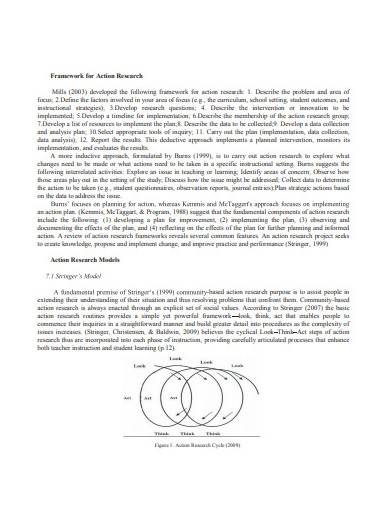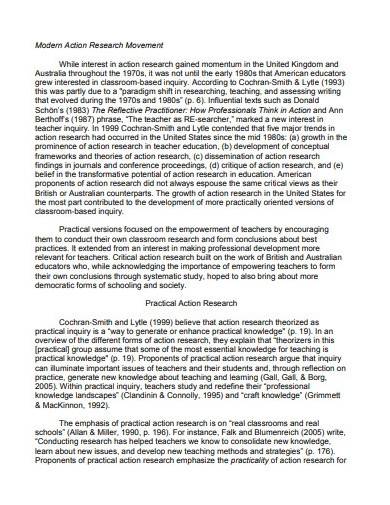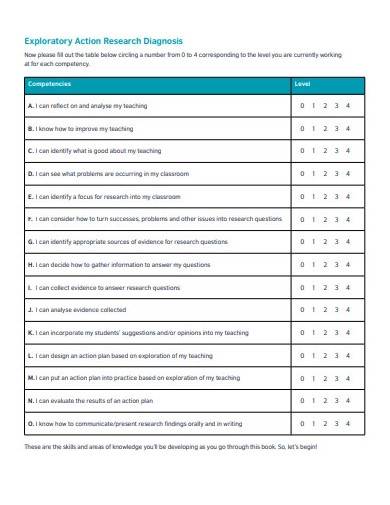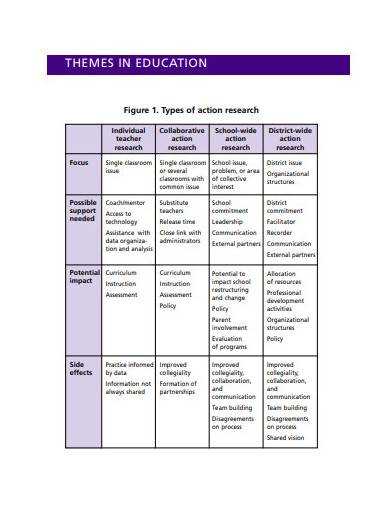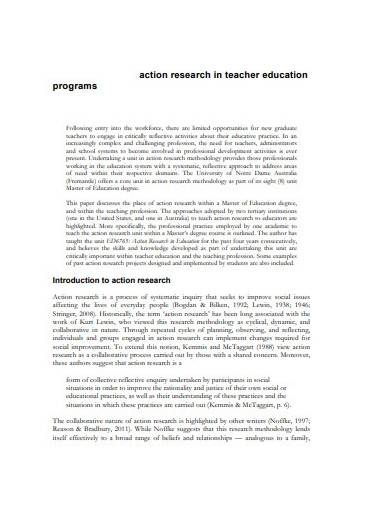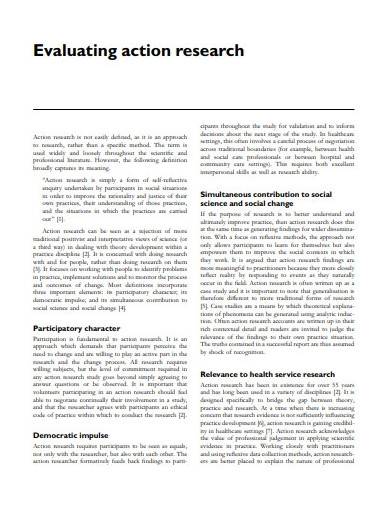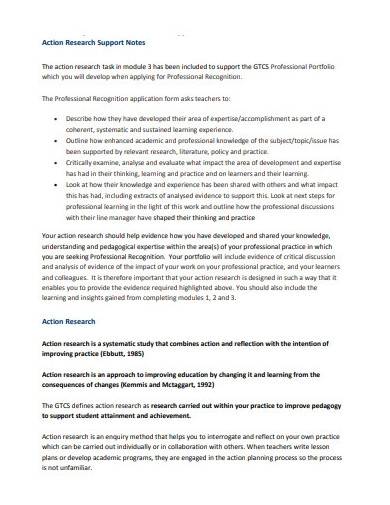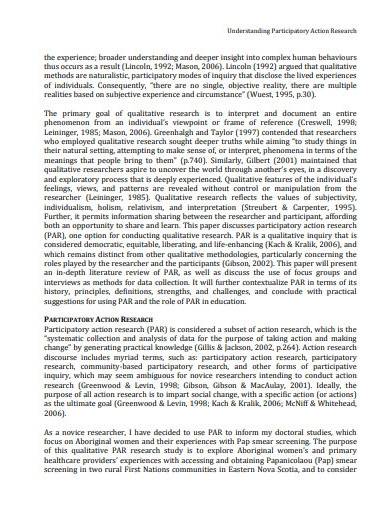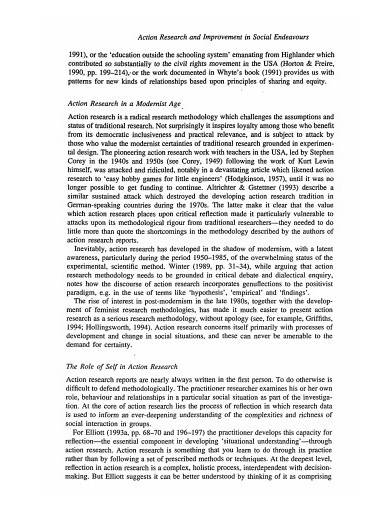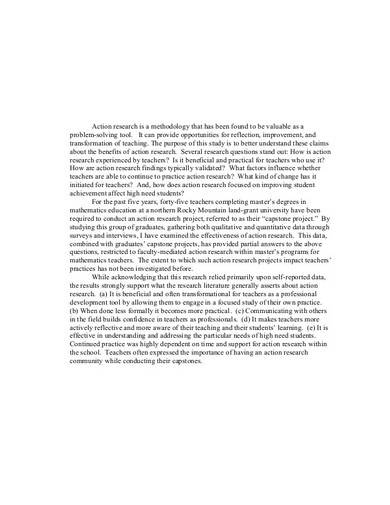In action research, researchers work closely with practitioners to identify a problem, gather data, data analysis plan, and develop and implement solutions. The process is iterative, with each cycle of research summary leading to further refinements and improvements in practice. The goal is to create meaningful change in real-world settings and improve outcomes for individuals or communities.
FREE 10+ Action Research Samples & Templates in PDF
1. Framework for Action Research
2. Origin of Action Research Template
3. Modern Action Research Movement
4. Exploratory Action Research Template
5. Action Research in Education Template
6. Action Research in Teacher Education Program
7. Evaluating Action Research Sample
8. Action Research Support Notes Template
9. Sample Participatory Action Research
10. Action Research & Improvement Template
11. Education Action Research Proposal
What is Action Research?
Action research is a research methodology that aims to address practical problems and improve practices by involving both researchers and practitioners in a collaborative process. This approach has become increasingly popular in a variety of fields, including education, healthcare, social work, and business plan.
How To Make Action Research?
Another strength of action research is its emphasis on collaboration and participation. By working closely with practitioners, researchers can gain a better understanding of the context and needs of the individuals or communities being served. The process of conducting action research involves several key steps:
Step 1- Identify the Problem
The first step in action research is to identify a practical problem statement or issue that you wish to address. This problem should be relevant to your field of work or study and should be something that you can realistically address through research. Once you have identified a problem, you will need to develop a research question that clearly defines the scope of work your research. Your research question should be focused and specific, and should guide your research process.
Step 2- Collect the Data
In action research, data collection is typically done through observation, interview analysis report, survey samples, or other methods of data collection. It is important to use multiple methods to collect data in order to get a comprehensive understanding of the problem and its context. After collecting data, you will need to analyze it to identify patterns, trends analysis, and themes. This will help you to develop a deeper understanding of the problem and identify potential solutions.
Step 3- Develop a Plan
Based on your analysis of the data, you will need to develop a plan of action to address the problem. This plan should be specific, measurable, achievable, relevant, and time-bound (SMART Goal statement). Once you have developed your plan of action, you will need to implement it. This may involve working with colleagues, stakeholders, or other professionals to make changes to practices or policies.
Step 4- Evaluate the Results
After implementing your plan of action, you will need to evaluate the results to determine whether your intervention was successful in addressing the problem. This may involve collecting additional data or feedback samples from stakeholders. Finally, it is important to reflect on your action research process and make any necessary refinements or adjustments. This may involve revisiting your research question, modifying your data collection methods, or making changes to your plan of action.
In summary, action research is important because it improves practice, increases collaboration, builds capacity, empowers practitioners, and generates new knowledge.
Related Posts
FREE 10+ Content Validity Samples & Templates in PDF
FREE 10+ Construct Validity Samples & Templates in MS Word | PDF
FREE 10+ Code of Human Research Ethics Samples & Templates in MS Word | PDF
FREE 10+ Biography Research Report Samples and Templates in PDF
FREE 10+ System Documentation Samples & Templates in MS Word | PDF
FREE 10+ Process Document Samples & Templates in MS Word | PDF
FREE 10+ Longitudinal Research Samples & Templates in PDF | MS Word
FREE 10+ Causal Research Samples & Templates in MS Word | PDF
FREE 10+ Client Discovery Samples & Templates in MS Word | PDF
FREE 10+ Null Hypothesis Samples & Templates in MS Word | PDF
FREE 9+ Product Knowledge Samples & Templates in PDF
FREE 10+ Software Documentation Samples & Templates in MS Word | PDF
FREE 10+ Exploratory Research Samples & Templates in PDF | MS Word
FREE 10+ Experimental Research Samples & Templates in MS Word | PDF
FREE 10+ Descriptive Research Samples & Templates in PDF

